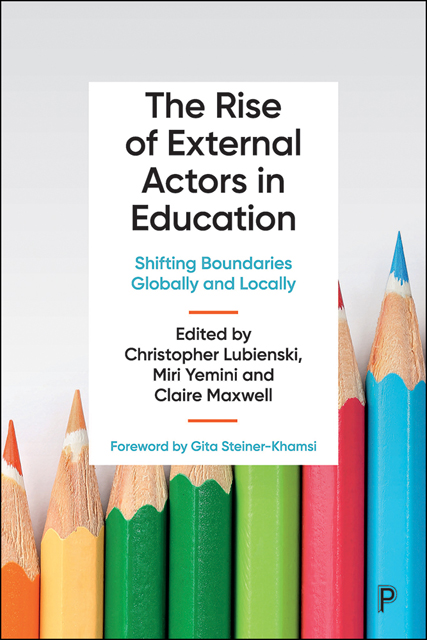Book contents
- Frontmatter
- Contents
- List of figures and tables
- Notes on contributors
- Foreword
- Introduction
- 1 Collective parental involvement: an in-between actor
- 2 When teachers become the external actor: private tutoring and endogenous privatisation in Cambodia
- 3 Cross-sectoral alliances in charter schools: the role of boards of directors from for-profit and non-profit sectors
- 4 A communitarian framework for understanding the relations between schools and NGOs
- 5 PISA for sale? Creating profitable policy spaces through the OECD’s PISA for Schools
- 6 Historical reconfigurations of internal/external actors in Danish educational testing practices
- 7 A short history of external agency involvement within education in contemporary Poland
- 8 New philanthropy in the heterarchical governance of education in Brazil
- 9 Venture philanthropy and the rise of external actors in Australian education
- 10 Power struggle in education policy change: the role of knowledge actors in structural reforms in Chile
- Conclusion: Complexity and intentionality of external actors in education
- Index
9 - Venture philanthropy and the rise of external actors in Australian education
Published online by Cambridge University Press: 13 October 2022
- Frontmatter
- Contents
- List of figures and tables
- Notes on contributors
- Foreword
- Introduction
- 1 Collective parental involvement: an in-between actor
- 2 When teachers become the external actor: private tutoring and endogenous privatisation in Cambodia
- 3 Cross-sectoral alliances in charter schools: the role of boards of directors from for-profit and non-profit sectors
- 4 A communitarian framework for understanding the relations between schools and NGOs
- 5 PISA for sale? Creating profitable policy spaces through the OECD’s PISA for Schools
- 6 Historical reconfigurations of internal/external actors in Danish educational testing practices
- 7 A short history of external agency involvement within education in contemporary Poland
- 8 New philanthropy in the heterarchical governance of education in Brazil
- 9 Venture philanthropy and the rise of external actors in Australian education
- 10 Power struggle in education policy change: the role of knowledge actors in structural reforms in Chile
- Conclusion: Complexity and intentionality of external actors in education
- Index
Summary
Introduction
External actors in education are increasingly proactive, organised, and sophisticated in their engagement in policy reform. This chapter explores the rise of external actors in policy reform in Australia by focusing on a major review initiated by the Australian Government in 2010. The Review of Funding for Schooling – Final Report (Australian Government, 2011), colloquially referred to as the ‘Gonski Review’, was critical for illuminating but also consolidating the power and durability of external actors. As influenced by Ball et al's (2017) network ethnography, the chapter pays attention to policy actors and policy reform by following people, things, metaphors, plots, and money. Similar to their following of individual policy actors, such as James Tooley or Irene Pritzker, I use major nodal actor David Gonski as a sociological and methodological device, as positioned within a network, to study how policy ‘moves’, the power of wealthy networks, and their influence on education reform, highlighting how major policy changes – which alter foundational architecture, funding, and governance of public education at the highest level – can be orchestrated via powerful networks (Ball et al, 2017).
These networks constitute a new form of power cartography in Australian public education, remapping traditional nation-state boundaries. These networks demarcate relatively fluid and open spaces that change and evolve in the making of relations, while simultaneously establishing relational boundaries which directly connect to powerful grids of policymaking. As government shifts to polycentric governance, this has a flow-on effect to the reconfiguration of traditional nation-state roles of power, such as government officials and bureaucrats, principals, and teachers. However, it achieves more than simply reconfiguring roles; it recreates modernised ‘power-geometries’ and reproduces policy networks and spaces (Massey, 2005). The chapter endeavours to show how policy is mobilised in the nation-state, as patterned by a broader global policy network; that is, ‘how nation states borrow, adopt and adapt policies from other parts of the world’ (Yemini & Maxwell, 2020, p 1).
The chapter is structured as follows: the next section discusses privatisation and marketisation in Australian education before exploring the Gonski Review and the introduction of philanthropy in Australian schooling.
- Type
- Chapter
- Information
- The Rise of External Actors in EducationShifting Boundaries Globally and Locally, pp. 167 - 183Publisher: Bristol University PressPrint publication year: 2022

